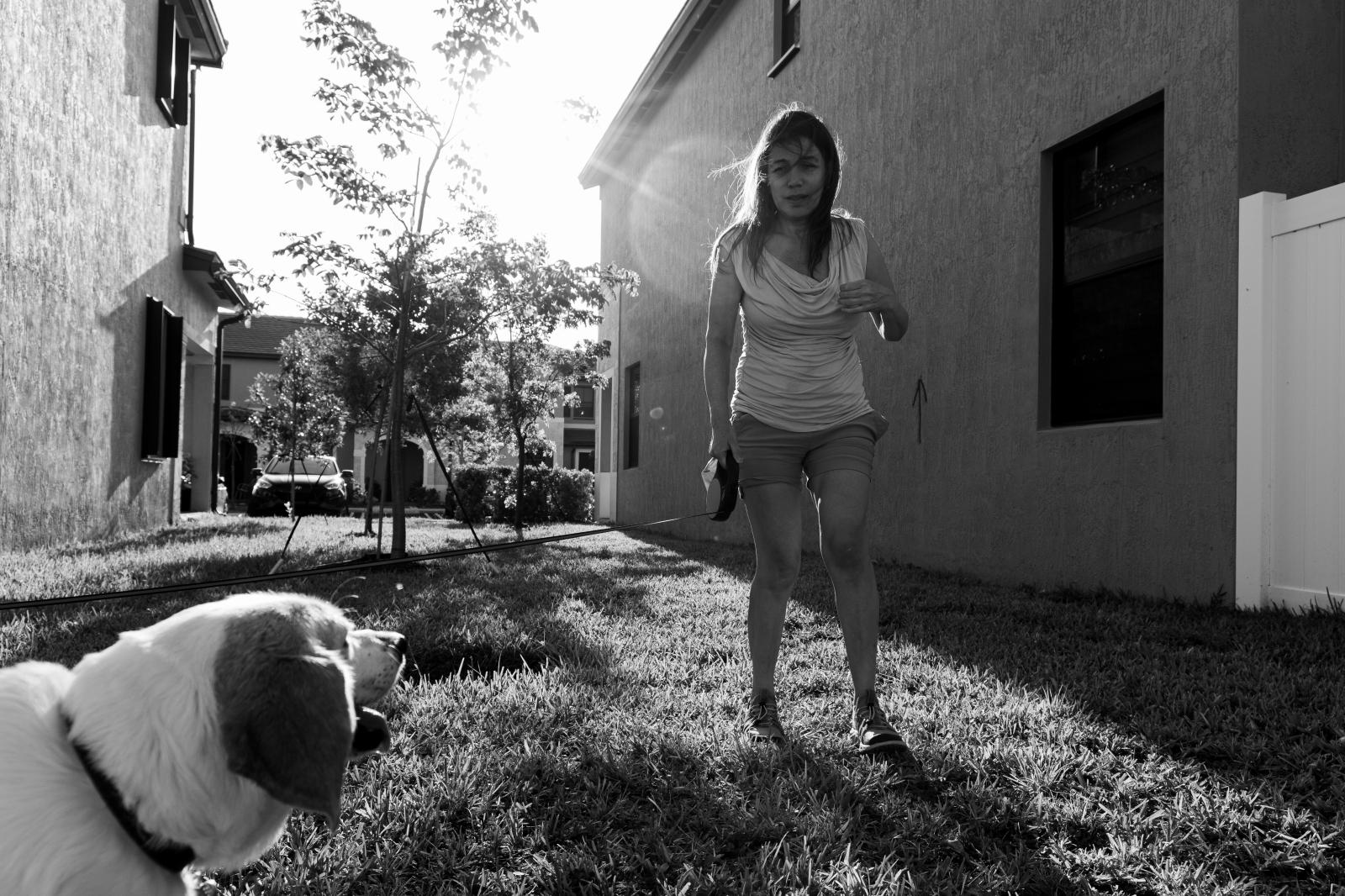We live in a hurry. So much so that we have become accustomed to summarizing entire sentences in acronyms. Something that seems harmless becomes the beginning and the end when that acronym is pronounced by a doctor. FTD, Frontotemporal Degeneration is a disease that affects the frontal lobe of the brain, as well as the temporal. What are these lobes responsible for? They control the functions of language, behavior, and motor skills.
FTD. Three letters that before 2019 meant nothing to Oralis nor to me. Those three letters knocked down the rest of our alphabet.
By the end of 2018 her behavior started to change. Memory problems, apathy, speech disorders. Her brain began to have trouble processing the simplest functions, although it was all very mild, so mild that doctors diagnosed her with depression.
This terrible condition changed us and changed our lives. Oralis can't take care of herself. Cooking, one of her great passions and the one to which she dedicated much of her adult life as a student and professional, is no longer an option. She can't take a shower alone and she needs help with all daily activities, even the most basic ones.
However, even in the most complex circumstances, human nature finds ways to express itself, it is like water that always manages to slide into microscopic cracks. So, when Oralis saw Bella for the first time, her face lit up and the nature of her heart prevailed. What do the frontal lobe and the temporal lobe know about love anyways? Love is not a basic function that is analyzed and processed, it can only be felt. We decided to adopt Bella and she, in her infinite animal innocence, has given Oralis profound happiness. But with a pet comes responsibilities, and that has been a positive, Oralis has a reason to keep busy and move forward.
But moving forward is not that easy. One of the hardest, most painful, and heartbreaking things about this process is knowing that this is just the beginning. This disease that physically affects Oralis, also diminishes me. The physical, emotional exhaustion caused by this reality are in a battle with the deep pain of seeing my life partner fading each passing. Your bad days hurt just as much as your good days. The FTD made our plans remain in a constant TBD.
Seeing how the partner I chose for this day and every day is getting loss into herself is devastating and lonely. Yes, we have friends and family who support us, but they don't understand that platitudes like "God knows why he does things", "Everything will be fine" or "You are a great man, it's a place in Heaven waiting for you" are as overwhelming as those three letters that changed our lives. A place in heaven? Oralis is my heaven on earth, the problem is this earthquake that doesn't seem to end.
I read someone say that Frontotemporal Dementia means losing your loved one it's like losing them against another illness, but instead of happening in a matter of hours or even days, it’s a daily loss that takes years. That's why a year ago I decided to start documenting the process and in this series of photographs, I want to show you the first part of our daily life diary through some moments that represent the passing of our days. Some good, some not so much and some very bad.
This will be a long journey, one we never wanted to be on, one that’s yet TBC.
Vivimos de prisa. Tanto, que nos hemos acostumbrado a resumir frases enteras en siglas. Algo que parece inofensivo se convierte en principio y final cuando las siglas las pronuncia un médico. FTD, Frontotemporal Degeneration (o Demencia Frontotemporal en español) es una enfermedad que afecta el lóbulo frontal del cerebro, así como el temporal. ¿De que se encargan estos lóbulos? Controlan las funciones del lenguaje, comportamiento y motricidad.
Efe, te, de. Tres letras que antes del 2019 no significaban nada ni para Oralis ni para mí. Tres letras que nos tumbaron el resto del abecedario.
A finales del 2018 ella comenzó a tener cambios de conducta, problemas de memoria, apatía, trastornos de lenguaje. Su cerebro comenzó a tener dificultades para procesar las funciones más sencillas, aunque todo era muy leve, tan leve que los médicos diagnosticaron depresión.
Esta terrible condición nos cambió y cambió nuestras vidas. Oralis no puede valerse por sí misma. Cocinar, una de sus grandes pasiones a la que le dedicó gran parte de su vida adulta como estudiante y profesional, ya no es una opción. No puede bañarse sola, necesita ayuda para todas las actividades diarias, incluso las más básicas.
Sin embargo, aún en las circunstancias más complejas, la naturaleza humana encuentra formas de expresarse, es como el agua que siempre consigue deslizarse en grietas microscópicas. Por eso, cuando Oralis vio a Bella, se le iluminó el rostro y la naturaleza de su corazón prevaleció. ¿Qué saben del amor el lóbulo frontal y el lóbulo temporal? El amor no es una función básica que se analiza, solo se siente. Decidimos adoptar a Bella y ella, en su infinita inocencia animal, solo le ha dado a Oralis una felicidad profunda. Pero con una mascota vienen responsabilidades, y eso ha sido positivo, Oralis tiene una razón para mantenerse ocupada y seguir adelante.
Pero seguir adelante no es tan fácil; una de las cosas más duras, dolorosas y desgarradoras de este proceso, es saber que esto es solo el comienzo. Esta enfermedad que afecta a Oralis físicamente, también me disminuye a mí. El agotamiento físico y mental que conlleva cuidar de ella batallan con el dolor profundo de ver que mi compañera de vida se desvanece con el paso de los días. Sus días malos duelen tanto como sus días buenos. El FTD hizo que nuestros planes quedaran en un constante TBD (To Be Defined).
El ver cómo la cómplice que elegiste para este y todos los días se va perdiendo en sí misma es desolador y solitario. Sí, contamos con amigos y familiares que nos apoyan, pero no entienden que los lugares comunes como “Dios sabe porqué hace las cosas”, “Todo va a estar bien” o “Eres un gran hombre, te ganaste el cielo” son tan agobiantes y endurecedores como esas tres letras que nos cambiaron la vida. ¿Ganarme el cielo? Oralis es mi cielo en la tierra, el problema es este terremoto que no termina.
Leí a alguien decir que la Demencia Frontotemporal es perder a tu ser querido como con otra enfermedad, pero en lugar de perderlo en un día, es una perdida diaria que toma años. Por eso hace un año decidí comenzar a documentar el proceso y, en esta serie de fotografías, quiero mostrar la primera parte nuestro diario diario de vida a través de algunos momentos que representan el transcurrir de nuestros días. Algunos buenos, unos no tanto y otros muy malos.
Este será un viaje largo, uno que nunca quisimos haber comenzado y que aún está TBC (To Be Continued).


















